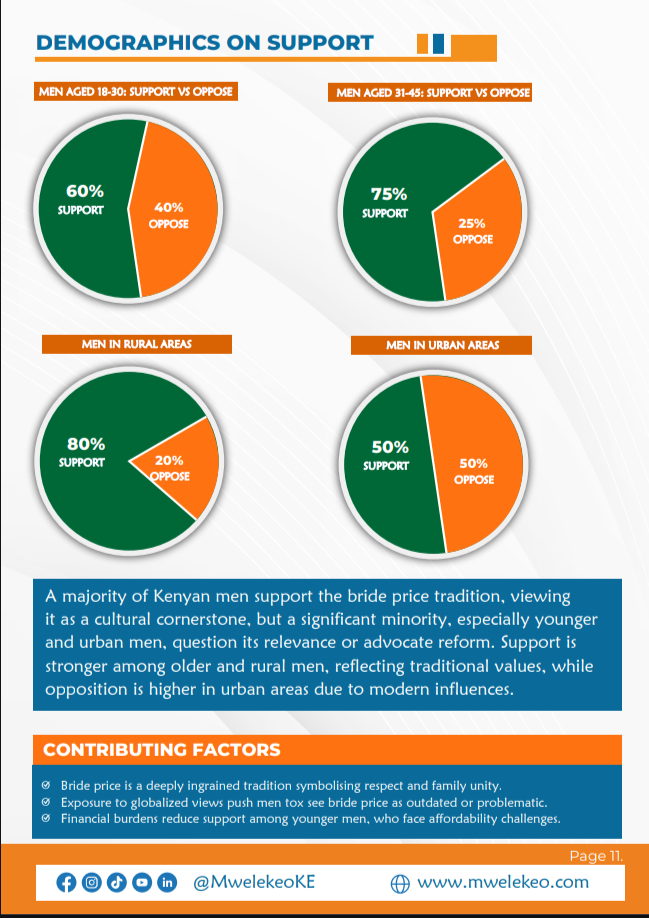The bride price tradition in Kenya remains a topic of deep cultural significance, yet it is also one that sparks considerable debate among men aged 18 to 45.
A recent survey conducted by Mwelekeo Insights reveals a picture of support, opposition, and calls for reform, shaped by factors such as age, location, education, and economic circumstances.
Starting with the level of support, the survey found that 53% of Kenyan men still favor the bride price tradition, while 47% oppose it.

This slight majority reflects a cultural attachment to the practice, particularly among older and rural men who see it as a symbol of respect and family unity.
However, opposition is stronger among younger and urban men, many of whom view it as outdated or financially burdensome.
For instance, while 75% of men aged 31-45 support the tradition, only 25% of those aged 18-30 do.

The cultural perception of bride price is another key finding.
A majority (59%) still regard it as an important tradition, reinforcing family ties and social cohesion. Yet, 41% mostly younger and urban respondents question its place in modern society, arguing that it no longer aligns with contemporary values like gender equality and mutual partnership in marriage.

This divide suggests a generational shift, with younger men increasingly influenced by education, media, and feminist discourse. Economic concerns play a major role in shaping attitudes.
Over half (54%) of men cite affordability as a significant issue, particularly younger men who struggle with unemployment or low incomes. High bride price demands, often involving cash and livestock, create financial strain, delaying marriage for many. Some respondents even expressed resentment toward families that impose excessive payments.

Religion and culture also influence perspectives. While 34% of men see bride price as aligned with religious teachings (particularly in Christian communities) and cultural norms, 66% believe these traditions can be adapted such as through lower costs or symbolic gestures rather than rigid financial demands.

This openness to reform indicates that while many value the tradition’s symbolic meaning, they also recognize the need for flexibility in modern contexts.
A critical aspect of the debate is the impact of bride price on women’s autonomy. While 65% of men reject the idea that it commodifies women, a notable 28% especially educated and urban men argue that it reinforces patriarchal control.

This thighlights growing awareness of gender equality issues, with some men advocating for practices that promote mutual respect rather than transactional arrangements.
The financial and emotional pressures tied to bride price further complicate its acceptance.
Nearly 58% of men report that the expectation to pay affects their emotional well-being, causing stress and anxiety. Additionally, 23% link it to their social identity, feeling that failure to meet expectations undermines their masculinity.

These pressures are particularly acute for younger men, who face economic challenges while navigating societal expectations.
Given these concerns, many men are open to alternatives. A striking 65% support cost-sharing between partners, while 89% prefer a one-time payment rather than prolonged financial obligations.

Some even suggest replacing bride price with voluntary gifts or rewards for good behavior in marriage.
However, opinions on abolishing the tradition are split 48% support ending it, while 52% oppose this, reflecting deep divisions.

Key takeaways from the survey suggest that while many men still value bride price as a cultural practice, there is a strong push for modernization. Younger, educated, and urban men, in particular, advocate for reforms that reduce financial burdens and promote gender equality.
Many also desire more inclusive discussions, where their voices are heard in decisions traditionally dominated by elders.
To address these findings, the survey recommends several steps. Encouraging open dialogue between generations and genders can help reconcile differing views.
Financial literacy programs could ease economic pressures, while gender-sensitive education may foster more equitable interpretations of the tradition.
Religious and cultural leaders could also play a role in promoting symbolic rather than transactional practices. Ultimately, the survey by Mwelekeo Insights underscores that the bride price tradition in Kenya is at a crossroads.
While it remains deeply rooted, evolving social and economic realities are driving calls for change. Balancing cultural preservation with modern values of fairness and equality will be crucial in shaping its future.





















Add Comment